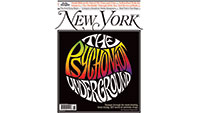
1. “I thought I knew what a psychonaut was until I read this—I never knew how different synthetics were,” wrote one commenter at nymag.com about Vanessa Grigoriadis’s cover story on the web-enabled world of DIY recreational drugs (“The Psychonaut Underground,” April 15). Another reached for his volume of Max Weber: “Gemeinschaft”—that’s German for “community,” we think—“among fellow psychonauts is so encouraging to see. I don’t think I approve of selecting my state of mind like I would watch a Netflix movie, but it is an interesting world to think about … The exotic compounds mentioned here do sound intriguing, but I enjoy the old standbys.” A third thought those standbys were the seeds of the whole new, byzantine drug ecosystem. “Ironically, laws designed to prevent the creation of marijuana that could have intense psychedelic effects have instead ensured that the science moved into a different direction, and ex-users report withdrawal symptoms being similar to opiate withdrawal (except with a lot more crapping and a little less vomiting). They really should just decriminalize the regular stuff (at the very least) before the use of the synthetics gets really out of hand.” Comedian (and Vulture contributor) Julie Klausner was a little more sanguine on Twitter: “Who will feed me synthetic #drugs and take me to see the #Pippin #revival?”
2. “Does BuzzFeed Know the Secret?” ran the headline of Andrew Rice’s profile of the news-and-advertising-hybrid site’s founder Jonah Peretti, which doubled as a meditation on the future of ads and journalism online (April 15). “Normally articles about the business of mutant digital journalism rather bore me, but this one’s remarkably interesting,” wrote sci-fi novelist and general futurist Bruce Sterling at Wired’s Beyond the Beyond blog. “Maybe I should spread it around or something.” At Gawker, Adam Weinstein took the gag further, turning the article into a ten-sentence slideshow listicle like those BuzzFeed has perfected. At Reuters, Felix Salmon took issue with some of Rice’s analysis—particularly about the relative value of “native advertising,” ads designed to look like editorial content, and recognizable banner ads like those you see on most websites. (Spoiler: He thinks native is more valuable than Rice does.) “For one thing, he’s wrong that that native advertising is fundamentally ‘mundane,’ and provides just a ‘modest’ uplift to whatever you can achieve through more traditional channels,” Salmon wrote. “Banner ads are never engrossing, they’re never shareable, and insofar as they attract your attention they do so in an evil way, by animating or blinking or otherwise distracting you from whatever it is you are trying to read. When someone reads a BuzzFeed ad from Virgin Mobile or Geico or GE, they might ‘only’ have a 20% or 30% chance of sharing it. But that’s not really the point. The point is that they read it, and they liked reading it … Native advertising (as well as content marketing, insofar as there’s a distinction) is a way of communicating with web readers in a language they’re receptive to. And it turns out that when you do that, they actually listen. And there’s another way that it’s disruptive, too: It utterly upends the standard ad-agency business model. This is the real reason that ad agencies are less than enthusiastic about native—they can’t make money at it. Native shops like BuzzFeed or Barbarian Group will never be as profitable as the huge ad agencies, but they can still cause those agencies to suffer very large drops in their digital revenues. The big unanswered question, then, is not whether native has disruptive potential—it clearly does. Rather, it’s whether native will ever be able to truly scale.”
3. After the story was published, BuzzFeed’s “science adviser” Duncan Watts wrote in to tweak the version we’d published of the formula he came up with to describe online virality: We reported it as n = pN (1+ R+ R2+ R3 +K) = pN/(1- R), but Watts told us that it is more accurately reflected in this formula: n = pN(1+ R+ R2 +R3 + … ) = pN/(1- R). We stand corrected.
Send correspondence to: [email protected]